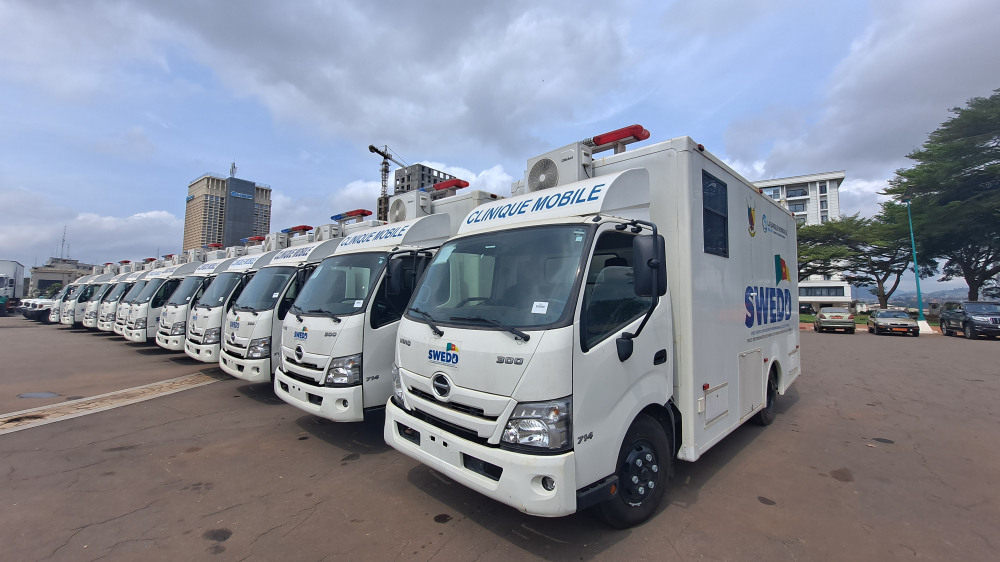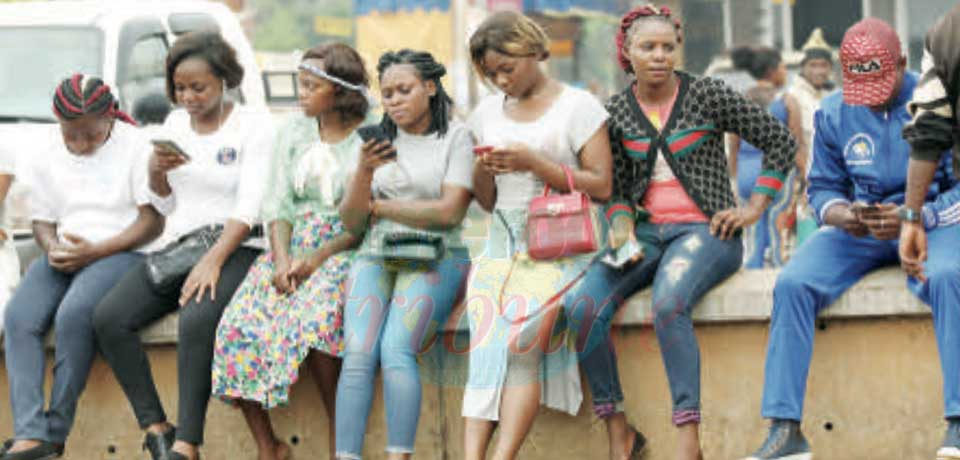Telltale Dividends Of A Worthy Venture
- Par Kimeng Hilton
- 18 mai 2025 18:33
- 0 Likes

The Sahel Women's Empowerment and Demographic Dividend in Sub-Saharan Africa, SWEDD project on May 15, 2025 presented its balance sheet in the Cameroonian capital, Yaounde.
And also donated equipment and rolling stock to two government ministries. SWEDD seeks to keep girls in school, increase access to family planning services, harness the demographic dividend and reduce gender inequalities.
“The development of Cameroon's human capital depends on the empowerment of women and girls, including in the Sahelian regions. Gender equality is a powerful lever for the structural transformation of the national economy and Cameroon's achievement of emerging country status by 2035,” Alamine Ousmane Mey, the Minister of Economy, Planning and Regional Development, MINEPAT, said at an earlier occasion. He is also Chair of the Steering Committee of the Sahel Women's Empowerment and Demographic Dividend, SWEDD project.
The Report
On May 15, 2025 in the Cameroonian capital, Yaounde, SWEDD gathered partner government ministries, United Nations agencies, the representative of the World Bank in Cameroon – amongst others – to present the project’s technical and financial assessment. Since it was rolled out in Cameroon in 2021, joining other Sahel nations in its second phase.
Project Donation
The crowd-pulling event in the grounds of the Yaounde City Council also saw the handover of equipment and rolling stock to the Ministry of Youth and Civic Education and the Ministry of Public Health. To assure continuity and sustainability of project activities – as the second phase in Cameroon comes to an end.
Project Objectives
With the objective of accelerating demographic transition, triggering the demographic dividend, and reducing gender inequality in Cameroon, SWEDD project acquired equipment and rolling stock consisting of 12 mobile clinic vans, four refrigerated trucks, three ambulances, three platform trucks, and five forklifts, United Nations Population Fund, UNFPA Cameroon Resident Representative, Dr. Justin Koffi affirmed.
The equipment, financed by a World Bank loan, were handed over to the Ministry of Youth and Civic Education and the Ministry of Public Health by Mr. Alamine Ousmane Mey, the Minister of Economy, Planning and Regional Development, MINEPAT.
Commendable Achievements
SWEDD project in Cameroon has carried out a number of activities, including the distribution of 32,000 school kits with solar school bags, 3,000 menstrual hygiene kits, 3,000 literacy kits, and 1,040 bicycles. As well as the provision of training materials to 67 adolescent reproductive health units, 165 vocational training centers, and 16 midwifery schools to local officials of several ministries, Dr Koffi said.
School Attendance Challenges
Meanwhile, studies carried out by SWEDD revealed a drop-out rate of 3.0% for the Northern regions of Cameroon as a whole, with a peak of 10.4% in rural areas. Nearly 7 out of 10 girls who have dropped out are still in primary school, while 63.9% of girls who have dropped out are Christian. And just over a third of them (67.6%) are aged between 16 and 18, according to the study report, “Etude sur le décrochage scolaire et les stratégies de maintien des filles à l'école dans les régions septentrionales du Cameroun.”
Keeping Girls In Schools
As well as distributing school supplies, SWEDD has since 2021 organized campaigns to raise awareness in local communities on the importance of educating girls. SWEDD Cameroon worked closely with parents, community leaders and schools to highlight the long-term benefits of keeping girls in school, both for them and for the development of their communities.
‘Education is a powerful tool for breaking the cycle of poverty and enabling young girls to build a better future,” said Dr Mbah Ngami Alphonse Glory, SWEDD Cameroon National Coordinator. “By providing school kits, we are not just responding to an immediate need, we are investing in the future of young women,” he emphasized.
In Line With National Development Goals
It is worth recalling that Cameroon is implementing the 2020-2030 National Development Strategy (NDS 30), one of the pillars of which is the development of human capital and the wellbeing of the population. Continuing with this policy, Cameroon entered the second phase of the SWEDD Regional Project in 2021, with the signing of an initial financing agreement of 44.9 billion FCFA with the World Bank.
Following a restructuring in February 2024, the SWEDD project in Cameroon ultimately secured nearly 16 billion FCFA. This amount helped in financing the government's strategic interventions to empower women and girls and ensure their access to quality reproductive health services in the Far North, North, and Adamawa Regions.
Innovative Approach
Thanks to a multi-sectoral implementation approach involving several ministries, technical assistance from the United Nations Population Fund, UNFPA, local authorities, and target communities, SWEDD project achieved 92% of its development objective indicators and 79% of its intermediate outcome indicators, the UNFPA Cameroon Resident Representative pointed out.
Worthy Of Celebration
The disbursement rate of committed funding reached 81.1%. On the ground, SWEDD achieved several tangible achievements. The handover ceremony provided an opportunity to celebrate these numerous accomplishments. As it marked the transfer of SWEDD-2 project equipment and rolling stock to various sectoral hubs, Dr Mbah Ngami Alphonse Glory, SWEDD Cameroon National Coordinator, stated.
Lessons Learnt
It is in recognition of these results that Minister Alamine Ousmane Mey urged stakeholders to learn from the shortcomings of the project and sustain or even optimize the investments already made. The Minister finally confirmed Cameroon's wish to see SWEDD continue, or even be scaled up within the framework of SWEDD+ for the wellbeing of Cameroonians, Dr Mbah recalled.
Education, Vocational Training
According to Dr Mbah Ngami, the Sahel Women's Empowerment and Demographic Dividend (SWEDD) Project enabled 4,430 vulnerable girls to receive a schooling support grant in 2021 in the context of COVID-19. Similarly, 17,238 girls benefited from the payment of their required fees and registration for certificate examinations for the 2024/2025 school year in the Adamawa, Far North, and North regions.
Some 32,000 girls in years 5 and 6 in college received school kits, solar school bags, and 2,000 literacy kits in 450 primary schools and 227 secondary schools. Some 28,867 girls in Form One and Class Six benefited from support classes to address learning and composition difficulties for attaining better grades. To facilitate transport for the most vulnerable secondary school girls, 1,040 of them were provided with bicycles to get to school.
Institutional Support
At the institutional level, 165 Women and Family Promotion Centres (CPFF), Multifunctional Youth Promotion Centres (CMPJ), Rural Craft and Homemaking Centres (SAR-SM), with a total capacity of 66,000 learners per year, were equipped. With 1,650 sewing machines, 330 overlockers, 660 sewing and plumbing kits, as well as various household appliances.
These support centres provide vocational training and life skills adapted to the needs of families and the local economy. SWEDD also acquired three podium cars to support community mobilization interventions by decentralized str...
Cet article complet est réservé aux abonnés
Déjà abonné ? Identifiez-vous >
Accédez en illimité à Cameroon Tribune Digital à partir de 26250 FCFA
Je M'abonne1 minute suffit pour vous abonner à Cameroon Tribune Digital !
- Votre numéro spécial cameroon-tribune en version numérique
- Des encarts
- Des appels d'offres exclusives
- D'avant-première (accès 24h avant la publication)
- Des éditions consultables sur tous supports (smartphone, tablettes, PC)














Commentaires